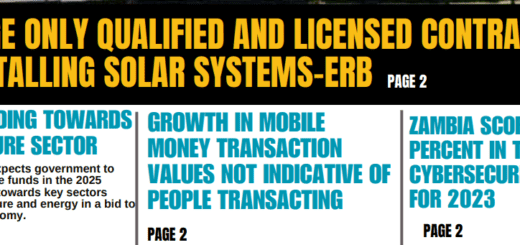Why Does The Government Want to Form Another Mining Holding Company Besides ZCCM-IH
On 18 August 2024, Mines Minister Paul Kabuswe hinted at the formation of a new government-owned mining company during an interview with ZNBC. The proposed entity, he noted, would be 100% government-owned and managed by Zambians, operating independently of ZCCM Investment Holdings PLC (ZCCM-IH).
While the announcement might initially sound promising—suggesting potential benefits for local industry—serious questions arise regarding the necessity and wisdom of creating yet another mining company under state control. The real reasons behind this move warrant a cutthroat examination.
ZCCM-IH, the government’s existing investment vehicle in the mining sector, already commands substantial influence in Zambia’s mining landscape. It holds majority stakes in copper, cement, energy, and related sectors, both directly and through various partnerships with global mining giants like Vedanta, First Quantum Minerals, and Jinchuan Group.
With this robust portfolio, one might naturally wonder why the government, which holds more than 77.53% of ZCCM-IH through the Ministry of Finance and Industrial Development Corporation, would seek to establish a separate mining company.
The first question to ask is whether this proposal implies a loss of faith in ZCCM-IH’s management or performance. After all, ZCCM-IH has been instrumental in Zambia’s mining sector for decades. Its investments include 49% in Mopani Copper Mines, 20% in Kansanshi Mining, and a minority stake in Konkola Copper Mines (KCM). Why, then, does the government feel the need to bypass this established entity?
ZCCM-IH is publicly listed on three stock exchanges—the Lusaka Securities Exchange, the London Stock Exchange, and Paris Euronext. Its structure brings an inherent level of oversight and transparency, with minority shareholders capable of demanding accountability.
Could it be that this transparency, while laudable, is seen as an obstacle by political actors who wish to evade scrutiny? By setting up a wholly government-owned and privately managed mining company, the government could escape the oversight that a listed company like ZCCM-IH faces.
Moreover, if the government believes ZCCM-IH is underperforming or inadequately managed, why has it not been transparent with the public about the specifics of these failures? Is the move to create a new company an admission that the government’s control over ZCCM-IH is slipping, or is it simply that the government finds ZCCM-IH too cumbersome to manipulate for political gain?
A key concern is whether this new company is being designed to operate outside the public eye. ZCCM-IH’s multiple listings provide a level of disclosure and corporate governance that might be uncomfortable for a government seeking greater latitude in how it allocates and manages mining revenues.
It is no secret that Zambia’s mining sector has long been marred by allegations of mismanagement and corruption, and one might fear that a new company—free from the constraints of public listings—could serve as a convenient conduit for political patronage and opaque dealings.
For a government seeking to balance its budget, manage debt, and address pressing socio-economic needs, controlling a fully government-owned company offers the flexibility to channel funds without having to justify every decision to institutional shareholders or foreign investors.
The timing of the announcement also raises eyebrows. With election cycles always looming and the temptation to dip into mining revenues for political financing ever-present, one cannot help but wonder if the government is preparing a new “cash cow.”
Another pressing concern is whether this move risks undermining ZCCM-IH’s mandate. By splitting the government’s focus between two mining companies, could Zambia’s mining interests become fragmented, with overlapping responsibilities and conflicting strategies?
ZCCM-IH, with its vast experience and deep ties to the global mining industry, is better positioned to steer the nation’s mining sector toward sustainable growth. Instead of creating a competing entity, wouldn’t it make more sense for the government to concentrate on strengthening ZCCM-IH, addressing any governance issues directly within the company, and ensuring its long-term viability?
After all, ZCCM-IH already holds substantial stakes in some of Zambia’s most valuable mineral assets, from copper to cobalt. Establishing a new mining company risks creating redundancy, wasting public resources on administrative costs, and diluting the country’s already limited management expertise in the sector.
In a global mining industry that demands efficiency and scale, duplication of state-owned enterprises is hardly a step toward progress.
Mines Minister Paul Kabuswe must provide clarity to the Zambian people. Is this new company being formed because of perceived inefficiencies at ZCCM-IH?
If so, what are these inefficiencies, and why can’t they be corrected within the existing structure? Or is this a matter of politics—an attempt to create a pliant vehicle for political financing ahead of future elections?
Given the crucial role that mining plays in Zambia’s economy, the stakes could not be higher. This is not just a policy issue; it’s a question of whether Zambia’s natural resources will be managed in a way that benefits all Zambians or whether they will be subjected to further exploitation by political elites.
Instead of circumventing ZCCM-IH, the government should aim to empower it, ensure stricter governance, and make it a more efficient custodian of Zambia’s mineral wealth. Setting up a parallel entity, no matter how well-intentioned, runs the risk of being viewed as a short-sighted attempt to sidestep existing checks and balances.
Minister Kabuswe’s suggestion of a new mining company raises more red flags than assurances. It’s high time the Zambian government took stock of the strengths it already has in ZCCM-IH, instead of attempting to reinvent the wheel—at potentially great cost to transparency and the nation’s mining future.








